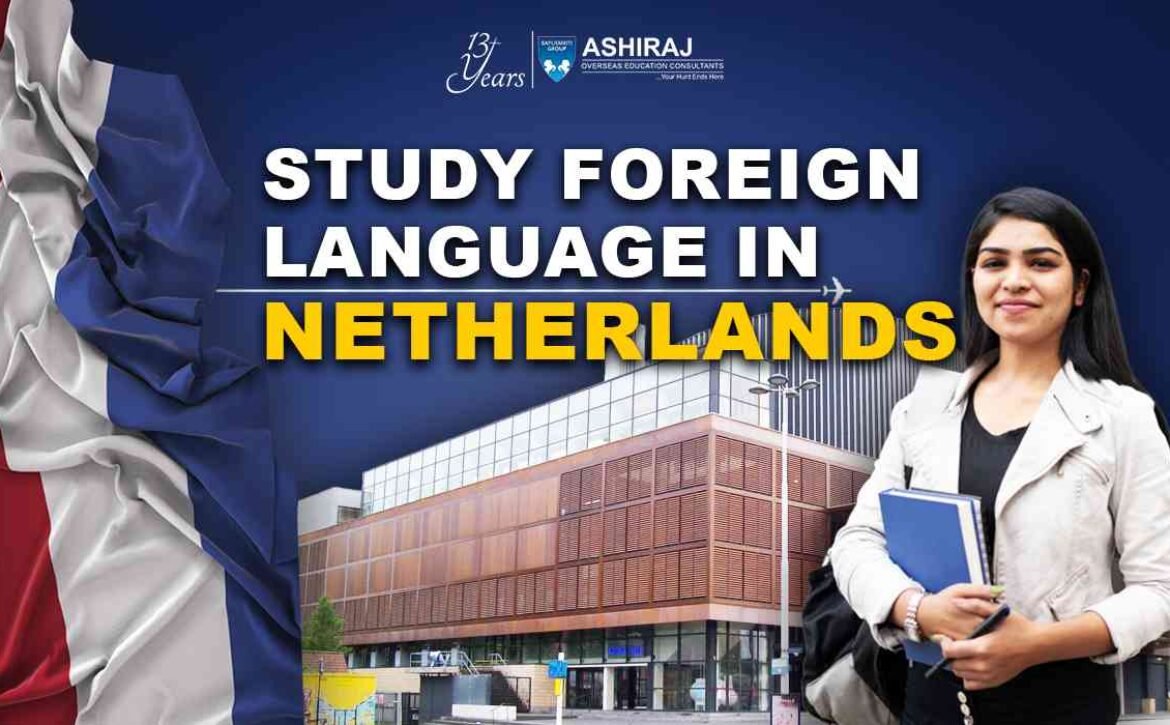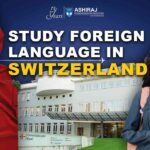
Foreign Language in Netherland
Foreign Language in the Netherlands plays a significant role in the country’s cultural, social, and economic fabric. As a nation known for its openness to the world, the Netherlands hosts a diverse population, and foreign languages are crucial for communication both domestically and internationally. Dutch, being the official language, is widely spoken, but the Netherlands is also home to a multitude of languages due to its historical connections and global outlook. English, in particular, is widely taught and spoken, making it a lingua franca in many sectors such as business, education, and tourism. Additionally, languages like German and French hold importance, especially in trade and diplomacy, reflecting the Netherlands’ position in the heart of Europe.
In the Netherlands, the significance of foreign languages extends beyond practical utility; it reflects the country’s embrace of multiculturalism and its commitment to global engagement. With its strategic location and open economy, proficiency in foreign languages opens doors to opportunities both within and outside the Netherlands. Moreover, the Dutch education system emphasizes the importance of multilingualism, with many schools offering a range of language courses to equip students with the skills needed for an interconnected world. As the Netherlands continues to thrive in a globalized context, the role of foreign languages remains indispensable in fostering cross-cultural understanding and facilitating international cooperation.
Why Study Foreign Language in the Netherlands?
- Global Outlook: The Netherlands boasts a thriving multicultural environment, making it an ideal place to study foreign languages and immerse oneself in diverse cultures.
- International Business Opportunities: Proficiency in foreign languages, particularly English, German, and French, enhances career prospects in the Netherlands’ dynamic business landscape, fostering connections with international partners.
- Education and Research: The Netherlands is home to prestigious universities offering a wide array of programs in various languages, providing students with opportunities for academic enrichment and research collaboration on a global scale.
- Cultural Enrichment: Learning a foreign language in the Netherlands allows individuals to delve into rich cultural traditions and explore literature, art, and history from different linguistic perspectives.
- Enhanced Travel Experience: With its central location in Europe, mastering foreign languages opens doors to seamless travel experiences, enabling individuals to navigate through different countries and engage with locals more effectively.
- Personal Growth and Development: Studying foreign languages fosters cognitive skills, enhances problem-solving abilities, and promotes cross-cultural understanding, contributing to personal growth and global citizenship.
- Networking and Social Connections: Fluency in foreign languages facilitates meaningful connections with people from diverse backgrounds, fostering friendships and professional relationships that transcend linguistic boundaries.
In conclusion, studying foreign languages in the Netherlands offers a myriad of benefits, ranging from career advancement and academic enrichment to cultural appreciation and personal development. Embracing multilingualism enriches lives and opens doors to a world of opportunities in the vibrant landscape of the Netherlands.
Top Universities to Study Foreign Language in Netherland
University | QS World University Rankings 2023 | Type of University | Average Annual Fees | Programs Offered |
University of Amsterdam | 25 | Public | €2,168 – €4,568 | Linguistics, Language Studies, |
Translation Studies | ||||
Leiden University | 122 | Public | €2,168 – €4,568 | Modern Languages, Linguistics, |
Translation Studies | ||||
Utrecht University | 121 | Public | €2,168 – €4,568 | Language and Culture, Linguistics, |
Translation Studies | ||||
Radboud University | 138 | Public | €2,168 – €4,568 | Linguistics, Modern Languages, |
Translation Studies | ||||
University of Groningen | 117 | Public | €2,168 – €4,568 | Applied Linguistics, Language and |
Culture, Translation Studies |
Studying foreign languages in the Netherlands offers an enriching experience, and several universities stand out for their exceptional language programs. Here are the top universities in the Netherlands for Foreign Language in NETHERLAND:
- University of Amsterdam: Renowned for its linguistic studies and translation programs, the University of Amsterdam consistently ranks among the top institutions globally.
- Leiden University: With a strong focus on modern languages and translation studies, Leiden University provides a comprehensive education in linguistics and language studies.
- Utrecht University: Offering diverse programs in language and culture, Utrecht University is a hub for students interested in linguistic research and translation studies.
- Radboud University: Known for its expertise in linguistics and modern languages, Radboud University offers innovative programs that prepare students for careers in language-related fields.
- University of Groningen: With a focus on applied linguistics and translation studies, the University of Groningen provides students with practical skills and theoretical knowledge to succeed in diverse language contexts.
These top universities not only offer quality education but also provide opportunities for cultural immersion and academic excellence in the vibrant landscape of the Netherlands.
Course Curriculum for Foreign Language in Netherland
- Language Proficiency: Courses focus on developing proficiency in speaking, reading, writing, and listening in the target language, emphasizing practical communication skills.
- Cultural Studies: The curriculum includes modules on the culture, history, and literature of countries where the language is spoken, providing students with a holistic understanding of the linguistic context.
- Translation and Interpretation: Students learn translation techniques and interpretation skills to effectively convey meaning across languages, preparing them for careers in translation, interpretation, and localization.
- Linguistics: Linguistic theory and analysis form a crucial part of the curriculum, helping students understand the structure, grammar, and phonetics of the target language.
- Language Technology: Some programs incorporate training in language technology and computer-assisted language learning tools, equipping students with modern language processing skills.
- Internship and Practical Experience: Many programs offer opportunities for internships, study abroad programs, or immersion experiences, allowing students to apply their language skills in real-world contexts.
- Elective Courses: Students can choose from a variety of elective courses based on their interests, such as specialized language courses, literature seminars, or cross-cultural communication modules.
- Capstone Projects: Some programs culminate in capstone projects or research papers, where students demonstrate their mastery of the language and its cultural context.
The course curriculum of Foreign Language in the Netherlands is designed to provide students with a comprehensive understanding of the language, its cultural nuances, and practical skills for global communication and career advancement.
Eligibility Criteria & Admission Requirements for MS in Foreign Language in Netherland
- Language Proficiency Tests: Applicants are typically required to submit scores from standardized language proficiency tests such as IELTS or TOEFL. Minimum score requirements vary by institution but generally range from 6.0 to 7.0 for IELTS and 80 to 100 for TOEFL.
- Graduate Entrance Exams: Some programs may require scores from graduate entrance exams like GRE or GMAT, especially for advanced degrees or programs with a strong emphasis on research or business studies.
- Passport & Student Visa: International applicants must possess a valid passport and obtain a student visa to study in the Netherlands. Visa requirements may vary depending on the applicant’s country of origin and the duration of the intended stay.
- Academic Certificates: Applicants are typically required to submit academic certificates, transcripts, and diplomas from previous educational institutions, demonstrating their academic qualifications and readiness for higher education.
- Work Experience: While not always mandatory, some programs may consider relevant work experience as part of the application process, especially for professional or specialized language programs.
Table: Standardized Test Scores
Test | Minimum Score |
IELTS | 6.5 |
TOEFL | 90 |
GRE | 300 |
GMAT | 550 |
Meeting the eligibility criteria ensures that applicants have the necessary language proficiency, academic background, and legal documentation to pursue their studies in Foreign Language in the Netherlands.
Documents Required for Studying Foreign Language in Netherland
- Passport: A valid passport is essential for international students intending to study in the Netherlands. It serves as proof of identity and nationality throughout the program.
- Letters of Recommendation (LOR): Applicants are typically required to submit two or more letters of recommendation from academic or professional referees who can attest to their character, academic abilities, and suitability for the program.
- Statement of Purpose (SOP): The SOP provides insights into the applicant’s academic and professional background, career goals, and reasons for choosing the particular language program in the Netherlands.
- Curriculum Vitae (CV): A comprehensive CV outlines the applicant’s educational qualifications, work experience, academic achievements, extracurricular activities, and any relevant skills or certifications.
- Official High School Transcripts and Educational Certificates: Applicants must provide transcripts and certificates from their high school or secondary education, demonstrating their academic performance and completion of required coursework.
- Work Experience Certificate: If applicable, applicants should submit a work experience certificate detailing their professional experience, roles, responsibilities, and duration of employment.
- Proof of Financial Resources: To ensure financial stability during their stay in the Netherlands, applicants must provide proof of sufficient funds to cover tuition fees, living expenses, and other related costs.
Submitting the necessary documents ensures that applicants meet the requirements for admission to Foreign Language in the Netherlands programs and facilitates a smooth application process.
Admission Process for Foreign Language in Netherland
- Research Programs: Explore available foreign language programs offered by universities in the Netherlands, considering factors such as curriculum, faculty expertise, and campus location.
- Check Eligibility Requirements: Review the admission criteria for each program, including language proficiency tests, academic qualifications, and any specific prerequisites.
- Prepare Required Documents: Gather necessary documents such as transcripts, language test scores (IELTS, TOEFL), letters of recommendation, statement of purpose, CV, passport, and proof of financial resources.
- Submit Online Application: Complete the online application form provided by the university, ensuring accuracy and completeness of all information provided.
- Pay Application Fee: Some universities may require payment of an application fee, which varies depending on the institution and program applied to.
- Wait for Admission Decision: After applying, wait for the university’s admission committee to review your application and make a decision.
- Obtain Acceptance Letter: Upon acceptance, the university will issue an acceptance letter confirming your admission to the foreign language program.
- Apply for Student Visa: Apply for a student visa at the nearest Dutch embassy or consulate in your country, using the acceptance letter and other required documents.
- Plan Accommodation and Travel: Arrange accommodation and travel arrangements to the Netherlands, ensuring a smooth transition to your new academic environment.
Following these steps ensures a systematic approach to the admission process for Foreign Language in the Netherlands programs, facilitating a successful transition to studying abroad.
“Education is the most powerful weapon which you can use to change the world.”
Nelson Mandela
Cost of Foreign Language Course in Netherland
- Tuition Fees: Tuition fees for foreign language programs in the Netherlands vary depending on the university, program duration, and level of study. On average, international students’ tuition fees range from €2,000 to €15,000 per year.
- Living Expenses: The cost of living in the Netherlands, including accommodation, food, transportation, and other daily expenses, can range from €800 to €1,200 per month, depending on the city and lifestyle choices.
- Books and Supplies: Additional expenses may include books, study materials, and supplies required for language courses, which can amount to a few hundred euros per year.
- Health Insurance: International students are required to have health insurance coverage during their stay in the Netherlands. The cost of health insurance varies but typically ranges from €80 to €120 per month.
- Visa and Residence Permit: Students from non-EU/EEA countries may need to pay fees for a student visa and residence permit, which can amount to approximately €192.
- Travel and Miscellaneous Expenses: Budget for travel, leisure activities, and miscellaneous expenses to ensure financial flexibility during your stay in the Netherlands.
Considering these factors, the total cost of studying Foreign Language in the Netherlands can vary but generally ranges from €10,000 to €20,000 per year, making it important for students to plan and budget accordingly.
Scholarships for Foreign Language Courses in Netherland
Scholarship Name | Amount | Application Deadline |
Holland Scholarship | Up to €5,000 | 1st February |
Orange Tulip Scholarship | Varies | Varies |
Erasmus Mundus Joint Master’s | Full tuition | Varies |
NFP Scholarship | Full tuition | Varies |
University-specific Scholarships | Varies | Varies |
Scholarships For Foreign Language in the Netherlands
- Holland Scholarship: Offers financial support of up to €5,000 for international students pursuing a bachelor’s or master’s degree in the Netherlands. Application deadline is typically on 1st February.
- Orange Tulip Scholarship: Provides scholarships of varying amounts to students from specific countries, covering tuition fees or living expenses. Application deadlines vary depending on the participating institutions.
- Erasmus Mundus Joint Master’s: Offers full tuition scholarships for international students enrolling in Erasmus Mundus joint master’s degree programs, with varying application deadlines depending on the specific program.
- NFP Scholarship: Provides full tuition scholarships for professionals from selected countries to pursue master’s degree programs in the Netherlands. Application deadlines vary by program and institution.
- University-specific Scholarships: Many universities in the Netherlands offer their scholarships for international students, covering tuition fees, living expenses, or both. Application deadlines and amounts vary by university and scholarship program.
These scholarships provide valuable financial support for international students pursuing Foreign Language in the Netherlands programs, making studying abroad more accessible and affordable.
Career Opportunities After Foreign Language in Netherland
Job Profile | Average Salary (per annum) |
Translator/Interpreter | €30,000 – €50,000 |
Language Teacher | €25,000 – €45,000 |
International Relations Specialist | €40,000 – €60,000 |
Content Writer | €25,000 – €40,000 |
Language Specialist in Business | €35,000 – €55,000 |
- Translator/Interpreter: Translates written or spoken material from one language to another, facilitating communication across languages. Average salary ranges from €30,000 to €50,000 per annum.
- Language Teacher: Educates students in foreign languages, focusing on grammar, vocabulary, and language proficiency. Average salary varies from €25,000 to €45,000 per annum.
- International Relations Specialist: Manages diplomatic and international relations between organizations or countries, requiring proficiency in foreign languages. Average salary ranges from €40,000 to €60,000 per annum.
- Content Writer: Creates written content for various platforms, including websites, blogs, and marketing materials, often requiring fluency in multiple languages. Average salary is between €25,000 to €40,000 per annum.
- Language Specialist in Business: Facilitates communication and negotiations in international business settings, ensuring effective cross-cultural understanding. Average salary varies from €35,000 to €55,000 per annum.
These career opportunities offer diverse paths for individuals proficient in Foreign Language in the Netherlands, with salaries reflecting the demand for language skills in various sectors.
Frequently Asked Questions About Foreign Language in Netherland
English, German, and French are among the most commonly spoken foreign languages in the Netherlands, with English being widely used in business and education.
Yes, many language programs in the Netherlands require applicants to demonstrate proficiency in the target language through tests like IELTS or TOEFL.
Yes, there are various scholarships available for international students, including the Holland Scholarship, Erasmus Mundus scholarships, and university-specific scholarships.
Tuition fees for foreign language programs in the Netherlands can vary widely, ranging from €2,000 to €15,000 per year, depending on the institution and program.
Yes, international students are allowed to work part-time (up to 16 hours per week) during their studies in the Netherlands.
The duration of foreign language programs in the Netherlands can vary depending on the level of study and the specific program, but typically ranges from one to four years.
Graduates of foreign language programs in the Netherlands can pursue careers as translators, language teachers, international relations specialists, and more.
Dutch language proficiency is not always required for studying foreign languages in the Netherlands, as many programs are offered in English.
The application process typically involves submitting an online application, providing required documents, and meeting language proficiency and academic requirements.
Yes, international students from non-EU/EEA countries usually need to obtain a student visa to study in the Netherlands for programs longer than 90 days.




